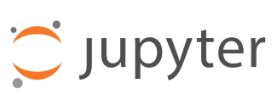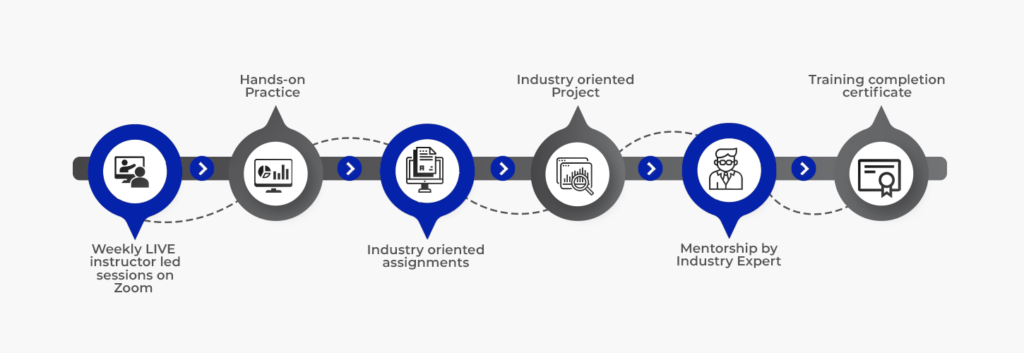
Overview
Presenting an Applied Hybrid Training on Data Science & Machine Learning.
Tools Covered



- Graduate or Masters Students with Statistics, CS or Mathematics background who want to start their career in the Data Science domain
- People who are working in the BI domain and want to advance their career in the field of Data Science
- Executive who want to build a Data Science department in their start-ups/organizations
- Fundamental concepts: Gain deep understanding of probability, statistics, and algorithms.
- Tools and technologies: Learn to use Python, R, and TensorFlow.
- Hands-on experience: Gain practical experience through real-world projects.
- Model selection: Select best machine learning models for business use cases.
- Communication skills: Develop effective communication skills for stakeholders.
Course Outline
- Week 1
- Week 2
- Basics of Data Science Flow
- Intro to Python
- Python Comparison Operators
- Importing Data in Python
- Data Aggregation using Group By, Pivot and Melt
- Anaconda Installation
- Python Objects & Data Structure
- Python Statements
- NumPy & Pandas Basics in Python
- Hands-On Assignment of Python
- Intro to Jupyter Notebook
- Subsetting (Strings, Lists, Dictionaries)
- Methods & Functions
- Subsetting Dataframes in Pandas
- Interactive Discussions on Last Weeks Assignments
- Data Centricity (Mean, Modes, Median, STD, Variance, Interquantile Range).
- Data Cleaning in Python
- Exploratory Data Analysis of Titanic dataset
- Correlation Matrix
- Types of Variables
- Box plot
- Visualization on Matplotlib
- Feature Engineering
- Hands-on Assignment of EDA
- Hands-on Assignment of EDA
- Data Visualizations (Scatter plot, Histogram, Bar plots, Line plots, Heat maps)
- Data Transformation (Log, Natural Log, Min Max )
- Visualization on Seaborn
- Techniques of Filling Missing values in EDA
- Week 3
- Week 4
- Interactive Discussions on Last Weeks Assignments
- Dependence vs Independence
- Machine Learning Playground
- Overfitting vs Underfitting
- Gradient Descent, Ordinary Least Squares
- What is Probability.
- Probability Trees & Bayesian Inference with their examples.
- Supervised Learning.
- Cross Validation using K-folds
- Project-1 Assigned to Students
- Conditional Probability (Disjoint Events + General Addition Rule).
- Machine Learning Basics
- Train Test Splitting
- Linear Regression
- Polynomial Regression
- Ridge Regularization
- Confusion Matrix.
- ROC Curve, AUC, TPR, FPR
- Multivariate Regression
- Model Complexity, Model Selection
- Classification
- True Positive, True Negative, False Positive , False Negative.
- Project-2 Assigned to Students
- Residual Plots, R square, Adjusted R Square
- Lasso Regularization
- Logistic Regression.
- Precision, Accuracy, Recall, F Measure.
- Week 5
- Week 6
- Interactive Discussions on Project
- Random Forest.
- What is Bagging
- Unsupervised Learning
- Elbow Analysis, Internal Indexes, Silhouette Score
- Decision Trees.
- Grid Search CV of Random Forest Hyper-parameters
- AdaBoost on Python
- Clustering
- Project-3 Assigned to Students
- Information Gain, Gini Index, Chi Square
- What is Boosting
- Multi-Classification and Analyzing its Confusion Matrix
- K-Means algorithm
- Elbow Analysis, Internal Indexes, Silhouette Score
- Project-3 Assigned to Students
- Interactive Discussions on Project
- Feature Scaling
- Hierarchical clustering
- External Indexes, Adjusted Rand Index
- Apriori Algorithm
- External Indexes, Adjusted Rand Index
- DBSCAN Algorithm
- Average vs Complete vs Ward linkage
- Hierarchical clustering Use Cases
- Association Rules
- Week 7
- Week 8
- Interactive Discussions on Project
- Social Network Analysis by Network Graph
- Principal Vectors/Components
- Info Loss and Principal Component Analysis
- Flask App Introduction
- Visualizing Association Rules
- Dimensionality Reduction Concept
- Composite Features
- Image Classification using PCA
- Model Deployment on Flask App
- Network Graph Theory
- Principal Component Analysis (PCA)
- Maximal Variance
- Model Deployment Basics
- Data Science Test
- Project & Presentation
- Self learning Path Guidance
Our Methodology
Industry Usecases
With real world projects and immersive content built in partnership with top tier companies, you’ll master the tech skills companies want.
Technical Support
Our knowledgeable mentors guide your learning and are focused on answering your questions, motivating you and keeping you on track.
Career Mentorship
You’ll have access to resume support, portfolio review and optimization to help you advance your career and land a high-paying role.

Frequently Asked Questions
Since our courses are led by Industry experts, so it is made sure that content covered in course is designed with hand on knowledge of more than 70-75 % along with supporting theory.
For this professional workshop, you need to have a PC with minimum 4GB RAM and ideally 8GB RAM.
Don’t worry! We have got you covered. You shall be shared recorded lectures after each session, in case you want to revise your concepts or miss the lecture due to some personal or professional commitments.
For executing the practical’s included in the Data Science Training, you will set-up tool on your machine. The installation manual for tool prep will be provided to help you install and set-up the required environment.
This Certification Training course includes multiple real-time, industry-based projects, which will hone your skills as per current industry standards and prepare you for the future career needs..


